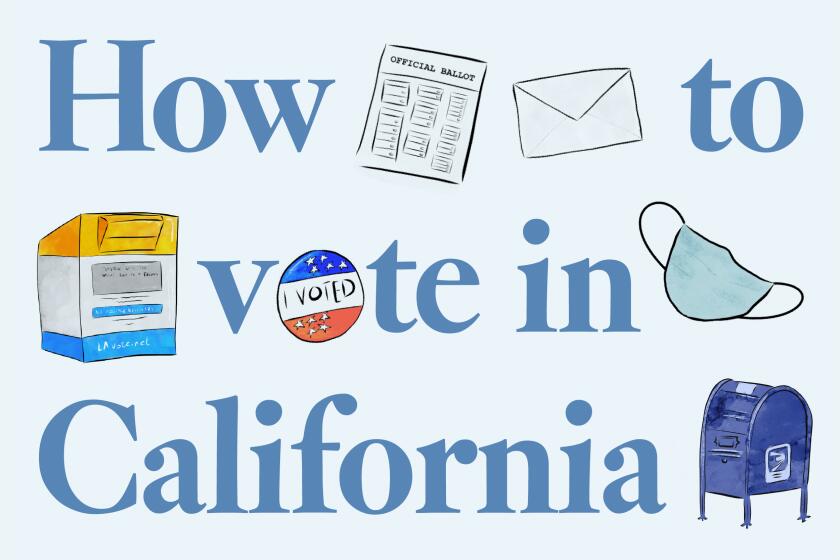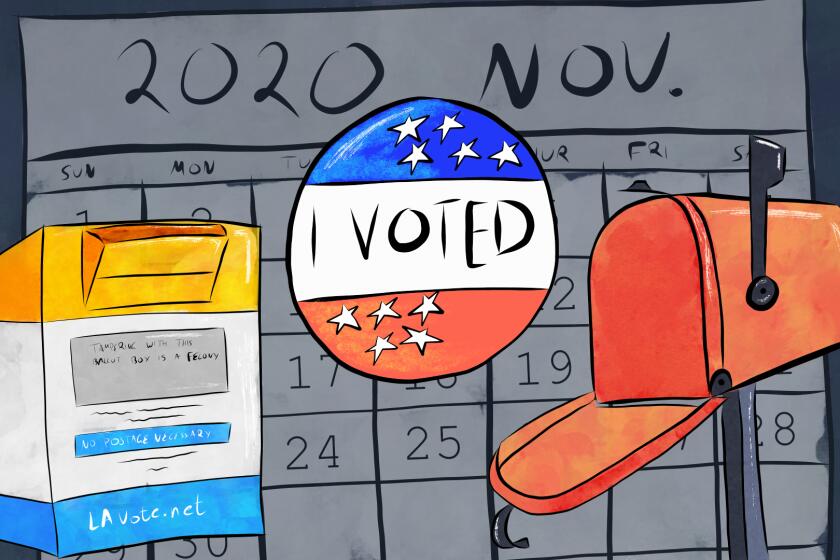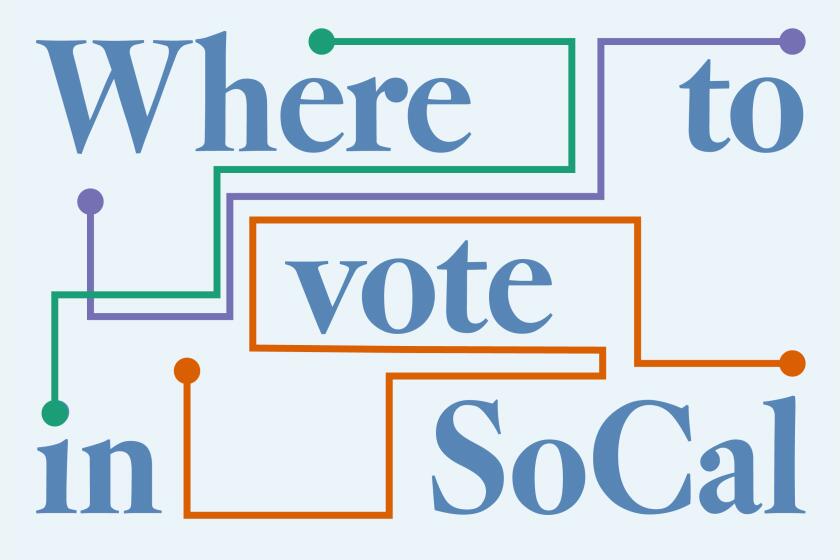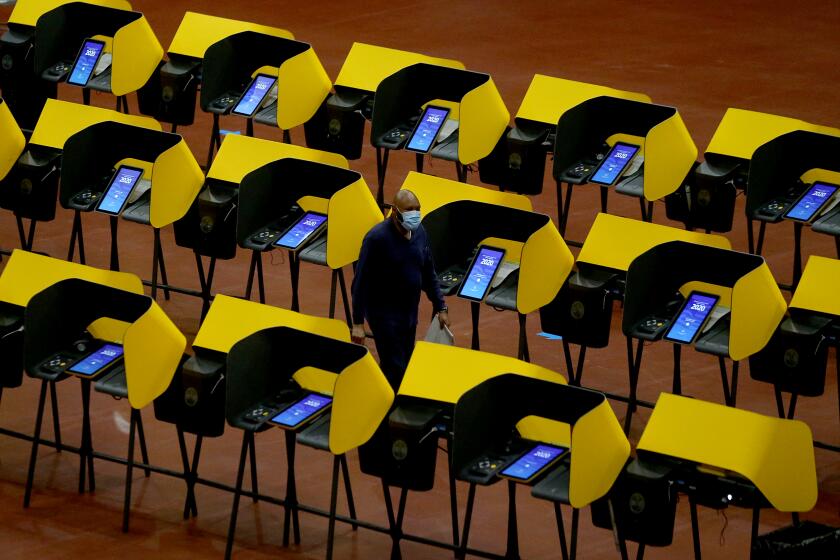How to become an L.A. County poll worker for the 2020 election

Mail-in ballots, registration deadlines, voting centers — we’ve got you covered with the basics of voting in the Nov. 3 election.
If you want to do more than vote in the 2020 election, consider becoming a poll worker to participate in democracy and facilitate a free and fair election. Polling places in Los Angeles County are in particular need of tech-savvy people to help voters navigate balloting technology and bilingual people to meet the needs of a diverse electorate.
Traditionally, many poll workers have been retirees who don’t have to find child care or take a day off work to do it — but because of the COVID-19 pandemic, many older people may opt against it this year, said Robert Brandon, president and chief executive of the Fair Elections Center, a nonpartisan, Washington-based voting advocacy organization. If there aren’t enough people to work at polling locations, some of those locations may not be able to operate, he said.
“We saw this in the primaries: Many of those older poll workers were concerned about the pandemic, and they didn’t [work the polls] in the primary, and we saw it play out in the forced reduction of polling sites, more distance for people to travel,” Brandon said. “It really does mean people get disenfranchised when there aren’t in-person options for folks.”
Poll workers do things like set up the polling place, instruct voters on how to use the machines, verify names and addresses in the registers, hand out ballots, manage lines, help with curbside voting, direct traffic and answer questions. This year, poll workers will also be enforcing social distancing and offering hand sanitizer and masks.
There are two categories of poll worker jobs: poll clerks and poll inspectors. The poll inspector is kind of like the manager. In addition to the same duties as everyone else, they’re responsible for picking up the equipment before the election and dropping it off at the end of the day, as well as assigning jobs to the clerks.
Including training sessions and working on election day, poll clerks can earn a stipend of up to $140. Inspectors can earn up to $240. You’ll be paid via check four to six weeks after the election.
You’re eligible to be a poll worker as long as you’re a U.S. citizen 18 or older, a resident of California and a registered voter.
It’s a long day: Polls are open from 7 a.m. to 8 p.m., so poll clerks will be expected to arrive at 6 or 6:30 a.m. and stay until about an hour after the last person in line at 8 p.m. casts their vote. Inspectors will start earlier and end later.
It’s not too late to sign up to work the Nov. 3 election. “We’re always accepting applications for election workers,” Mike Sanchez, a spokesman for the L.A. County registrar of voters, wrote in an email.
You can apply online to become a poll worker in L.A. County, or by phone by calling (800) 815-2666 and selecting Option 7. You can also download and print out a paper application and mail it to the address listed.
Outside L.A. County, you can find information on becoming a poll worker at WorkElections.com, a site run by the Fair Elections Center.
What it involves
If you are hired as a poll worker, you’ll have to do online and in-person training before election day.
Steve Alloway, who’s served as a poll inspector in multiple local elections, said the online training lasts about an hour and in-person training lasts about two hours. You’ll watch instructional videos of what you’re supposed to do, how to set up the equipment and how to put the ballots through the scanner. You’ll also learn how to handle various situations, such as a person surrendering their mail-in ballot to vote in person, or someone who comes in to vote but whose name isn’t on your register.
The county will assign you to work at a polling location based on need. You and a friend can request to work at the same polling place, but there’s no guarantee you’ll be placed together.
As a poll inspector, Alloway said he typically picked up the equipment from the county a week and a half before the election and went to his assigned polling place the night before to start setting up the booths and tables. The day of the election, everyone arrives bright and early and gets the actual ballot boxes set up. The poll inspector is the one who formally declares “The polls are open!” out loud at 7 a.m.
The time usually goes by quickly. Chris Brito, who has served as a poll worker in every election since 1992, said presidential election days are always busy. He said as an inspector, he’ll usually have everyone rotate stations every hour or so to avert boredom.
Everyone who’s in line when the polls close at 8 p.m. has the right to cast a ballot. After every vote is cast, you balance the books, making sure the number of ballots cast and dropped off all add up. The equipment gets broken down, and the inspector returns it to the county. The boxes of ballots get sent off for the votes to be tallied at an official location.
Why it matters
Working the polls is a long day of work for what amounts to less than minimum wage. But it is a vital part of the democratic process.
People who have done it say it’s fulfilling, interesting and meaningful work. And this year, between the pandemic and President Trump casting unfounded doubts on the legitimacy of the election, it’s more important than ever.
“It’s something people need to get out and experience at least once in their life,” said Brito, who said he’s going to be a poll worker again in this election. “If you worked one, at least you made a little bit of a difference and made sure our election was secure and safe and gets done quickly. It’s part of our history. We need people to come out there and help people vote.”
California is sending mail-in ballots to all registered voters for this election, but poll workers are still needed: People can choose to vote in person instead or drop off their ballots at a polling place. The county has put together a Safe Presidential Election Plan to help ensure health precautions are observed so everyone can vote safely.
Working the polls “is very, very stressful, but it’s ultimately rewarding,” Alloway said. “You get to help people vote, and that in and of itself is important and rewarding.”
In addition, he said, every election he’s worked has had some special moment that stuck with him: helping an elderly blind person cast a ballot, or the time during a particularly slow point when the only person at the polls invited him to come outside and use special glasses to watch Venus as it crossed in front of the sun.
California’s November election will feature 12 statewide ballot measures.
More to Read
Get the L.A. Times Politics newsletter
Deeply reported insights into legislation, politics and policy from Sacramento, Washington and beyond. In your inbox three times per week.
You may occasionally receive promotional content from the Los Angeles Times.















